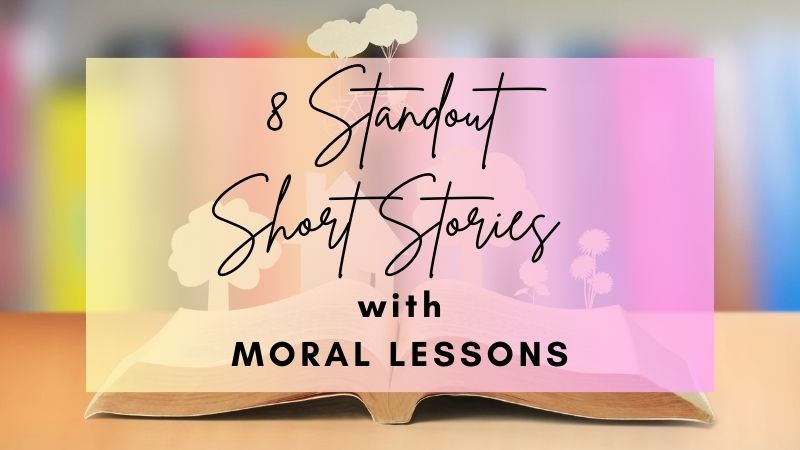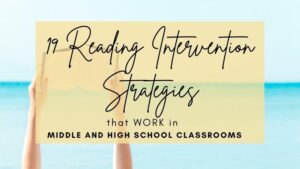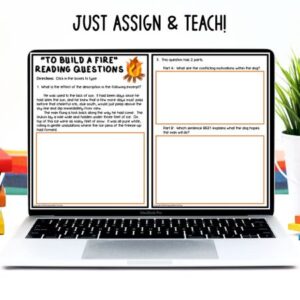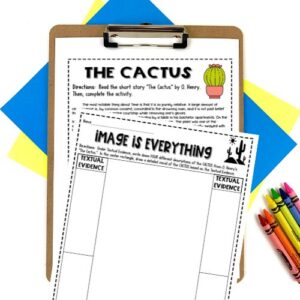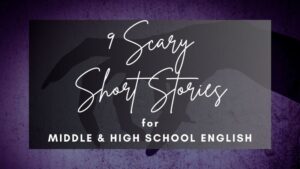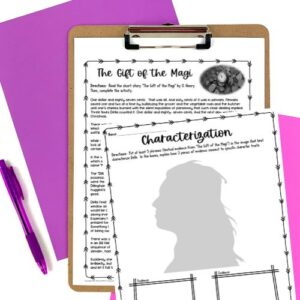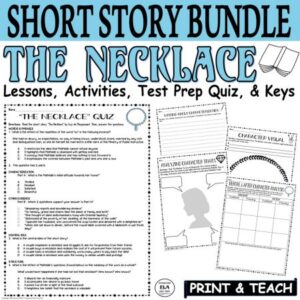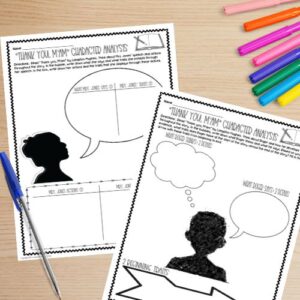Sometimes, I want a short story to simply be a moment of escape. I don’t want to experience an important life lesson; I just want to be entertained like in Shirley Jackson’s “The Lottery” or Edgar Allan Poe’s “The Tell-Tale Heart.” Other times, however, I want to soak in short stories with moral ideals!
A moral, or theme, teaches us something about ourselves and others. We get to learn and grow in some tangible way, and stories that provide this offering are necessary in the literary canon.
Keep reading below for 8 Standout Short Stories With Moral Lessons that you can use in ANY secondary classroom!
Need help with Reading Test Prep? Check out this FREE Pack of 3 Test Prep Activities to help students achieve success on standardized tests!
8 Standout Short Stories With Moral Lessons
A moral, for all intended purposes, is another word for THEME. A theme is the message of a text. Because it is a message, it MUST be written in a complete sentence and contain a connection to a topic or idea from the text. A simple phrase is not quite enough for a thematic statement.
Developing themes for short stories with moral lessons would be a fantastic focus while reading any of the texts below!
1. “To Build a Fire” by Jack London
I love “To Build a Fire” so much! It mirrors my own life in so many ways, which is why it is one of my favorite short stories with moral lessons!
The protagonist, a man with an overabundance of pride and confidence, ultimately fails in an extreme fight for survival. Like me, he believes he can defy the odds and escape an impossible situation.
Teaching this story with passages from The Call of the Wild or White Fang might help in rounding out similar ideas regarding the conflict of Man vs. Nature!
Click below for easy-to-teach activities for To Build a Fire by Jack London!
2. “The Cactus” by O. Henry
One of my favorite things about this short story by O. Henry is its clever twist ending! Many short stories with moral lessons have similar twist endings, which could be why they make such great additions to thematic units!
O. Henry’s “The Cactus” tells the story of a budding romance. A young man tries to charm a young woman, but his boastful nature leads to an unfortunate misunderstanding.
Personally, I think we have all been there, at least when it comes to boastfulness. We all have something we get a little prideful about, to our own detriment most of the time.
You could teach a simple plot activity or examine how the characters change and/or develop over the course of the story!
Click to get teaching ideas here>>>The Cactus Lesson BUNDLE
3. “After Twenty Years” by O. Henry
Loyalty is a concept students are extremely focused on in middle and high school, so including short stories with moral ideas connected to loyalty is a great way to encourage students to engage with certain texts! How can a student even navigate the school hallways without friends to help along the way? Loyalty is vital!
But all friendships change over time as any adult knows. The main characters, an officer and a criminal, experience this situation in the story “After Twenty Years” by O. Henry!
Breaking down this easy-to-read plot through a focus on comparing and contrasting the two main characters will help your students get to the moral (theme) of the story quite easily, as you really feel for both characters (even the criminal one).
Click to buy this BUNDLE to make teaching this short story SIMPLE & EASY!
4. “The Pedestrian” by Ray Bradbury
The story “The Pedestrian,” like its title, is incredibly unassuming. A man in a not-far-off future walks his neighborhood alone. Unlike others who sit in front of screens day and night, the protagonist chooses to go for a stroll, a seemingly innocuous activity.
While on his walk, he encounters an unmanned, robotic police vehicle. Because of its programming, it cannot understand Leonard’s (protagonist’s) intentions and labels him mentally incapable, carting him off to an asylum.
This dark tale teaches about the dangers of reliance on and addiction to technology, a moral we can all learn from! If you need help teaching characterization and theme for “The Pedestrian,” go here!
Need some ideas for teaching scary short stories? Click below!
5. “The Gift of the Magi” by O. Henry
If you are anywhere near the holiday season, “The Gift of the Magi” by O. Henry is one of the best short stories with moral attributes woven throughout!
This short story depicts a couple lamenting their slightly impoverished state. They want to give each other gifts to celebrate the Christmas season; however, they have limited means, like most people in the world today.
Instead of sitting around moping, they both choose to sacrifice the little they have in an interesting way in order to surprise the other for Christmas. The moral, or theme, involving sacrifice will encourage anyone who reads this short story to think beyond oneself during the holiday season.
Want an easy way to teach characterization, reading comprehension, and visualization for The Gift of the Magi? Click the image below!
6. “The Scarlet Ibis” by James Hurst
I don’t know about you, but if you have read “The Scarlet Ibis” by James Hurst, I know you MUST have shed a tear or two. Good short stories with moral elements tend to do so unexpectedly.
Two brothers, one of whom experiences a disability, interact with each other as many siblings do. There is a constant tug of war between brotherly love and annoyance that most people with brothers or sisters can readily understand.
By the end of the story, we cry with the protagonist as he weeps for his brother who dies a tragic death. This story may be difficult to read for some, but it is completely worth it.
We need to be reminded once in a while that life is not just about us and what makes us happy. It also involves investing in the lives of others, especially in the lives of those less fortunate than we are. Ultimately, patience regarding family must take center place in our lives, which the protagonist learns too late. If you need step-by-step activities to teach this classic story, see this link!
7. “The Necklace” by Guy de Maupassant
I have yet to teach a student who did not like “The Necklace” by Guy de Maupassant. And engagement is super important when choosing short stories with moral concepts!
Unlike the female protagonist in “The Gift of the Magi,” Mathilde Loisel in the story “The Necklace” is self-focused. She cannot see the beauty of the comfort and security of her middle-class life.
Instead, she always thinks about the finer things in life she cannot attain. I think we have all been there a time or two. We may not envision the same “finer” things, but we all pretty much want more than we currently have.
When Mathilde Loisel is invited to a party, she borrows her friend’s necklace, a symbol to her of wealth. At some point, she loses the “expensive” diamond necklace and replaces it without telling her friend about its loss. Now, deep in debt, she and her husband become embittered and worn down through extremely difficult physical work. The resolution of the story involves the revelation that the necklace was, in fact, a cheap fake.
Can you imagine the impact of this knowledge on your psyche? Sometimes, it is simply better to tell the truth, even if it hurts your pride to do so. Clearly, this story shines as a prime example of classic short stories with moral concepts everyone should read!
8. “Thank You, Ma’am” (also known as “Thank You, M’am”) by Langston Hughes
During or around the week of Thanksgiving, “Thank You, Ma’am” (also known as “Thank You, M’am”) by Langston Hughes is one of THE BEST short stories with moral lessons to teach!
Let me give you a quick recap: A young boy attempts to steal a person from an older woman. Interestingly, she does not call the police and demand immediate punishment but invites the young man into her home, feeds him, and demonstrates love and care towards him.
Everyone could learn a thing or two from the older woman, Mrs. Jones.
Here are some thematic statements/morals one could learn from this story:
- Sometimes it is difficult to fathom someone’s kindness.
- Certain moments in life can change how you see someone.
Why teach short stories with moral lessons?
So often, our English curricula are rife with death, destruction, and despair. Think Romeo and Juliet, “The Raven,” or “An Occurrence at Owl Creek Bridge.” Don’t get me wrong; I love a good scare or death scene.
Sometimes, however, I want to feel hope in the human experience. We need to read about life, love, freedom, and other ideals that are important to us. Foremost, we must offer more short stories with moral lessons to our students, so they too can experience what can be!
If you want to make teaching short stories with moral lessons or other entertaining tales an EASY feat, get the BUNDLE below!
Need more help with teaching short stories with moral lessons? Check out my store Kristin Menke-Integrated ELA Test Prep!

